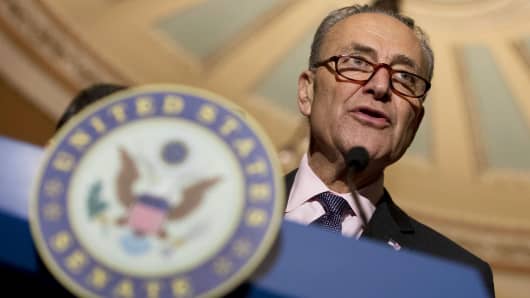While Democrats remain all too focused on anti-Trump conspiracy theories and the whole "resist" posture, they're ignoring a golden opportunity to win over the public on an issue that has killed them in the past: Obamacare.
In case you haven't noticed, the Congressional Republicans are flailing badly in their attempts to repeal and replace the health insurance law they've promised to kill for most of the last seven years. They're apparently so far away from the 50 votes they need, GOP Senate Majority Leader Mitch McConnell is already threatening to give up and work with the Democrats to shore up Obamacare instead.
It's an odd series of events, especially since the unpopularity of Obamacare and the way the Democrats passed and enacted it was the top reason they lost control of the House in 2010 and then the Senate in 2014. It also played a role in Donald Trump's White House victory last year.
But the Democrats can't just sit on their hands. If they wait for the Republicans to simply fail to pass a replacement bill and then come to them, then they'll be a part of the same uphill and confusing battle to shore up the failing Obamacare exchanges without triggering more voter anger.
What they should do instead is present a few clear proposals of their own to improve the Affordable Care Act and grab the chance to look like the party that can actually effectively govern.
Here are three ideas the Democrats could and should propose, that if packaged right, Republicans might even be able to agree with and make actual progress on health coverage costs for all:
1) Give the kids a break
Even with the subsidies provided by Obamacare to help less wealthy people buy ACA plans, young and healthy Americans have proven to be understandably reluctant to buy the pricey health insurance plans that are more tailored to older people. Many more of them have decided to simply accept the penalties for going without insurance than the CBO or any Democratic politician predicted.
Right now, Obamacare requires insurers to charge older Americans no more than three times the average premium price for the youngest adults. Originally, that limit was set up to be what was then the national average of a 5:1 ratio. Not only was that more fair in terms of health costs, but remember that older Americans are much more likely to be wealthy than younger ones. In fact, the last definitive study on the age gap in wealth conducted by the Pew Research Center found that older Americans are on average 47-times richer than younger ones.
But extensive lobbying by AARP got that 5:1 ratio reduced to the current 3:1 mark, and that made all the plans more costly and played a large role in discouraging young people from signing up for health insurance.
Democrats almost always market themselves these days as being the party that understands younger people best. Here's a good way to prove it and make health coverage more affordable at the same time. This is not a punishment to older Americans as much as it is fixing an advantage they should not have received from Obamacare.
At the same time, Democrats should also back off at least some of the "essential benefits" list that makes it impossible for insurers to sell the cheaper and more stripped down plans that also should appeal to younger customers on a budget. This will definitely cut into the revenue stream needed to prop up the Obamacare exchanges overall, but the last several years have shown that it can't possibly be any worse than the large number of young people who won't buy any plan at all.
2) Stand up to the hospitals
Democrats often talk about how they want to stand up to big corporate interests and it doesn't get much bigger than hospitals. They've been consolidating at a fever pitch for decades now and thus taking more advantage of their right to charge more for the same medical practices non-hospitals perform.
Reversing existing mergers is very difficult, but the Democrats could propose reducing hospitals' pricing premium for services. And they could push for restrictions on future hospital mergers as well.
3) Token tort reform will go a long way
Remember that President Obama himself dangled the idea of including tort reform in the ACA as a way to lure some Republicans to vote for the measure. He ended up pulling that off the table, but it's time to bring it back.
Nobody should expect the Democrats to offer major caps on medical malpractice cases like Texas imposed in 2003. But even many so-called "blue states" have capped damage awards in the past, including Maryland and New Jersey. Making even moderate caps the national standard would discourage jurisdiction shopping and save doctors, insurers, and patients money.
Remember, when it comes to tort reform it's not just about the cost of the damage awards but the costs of the added tests and procedures many caregivers conduct just to protect themselves legally. So the advantages here shouldn't be underestimated.
Again, these are proposals the Democrats could actually get behind without abandoning their stated principles as a party. More importantly, if they do back them now and back them with great public fanfare, it would make them look like the adults in the room.
But the clock is ticking. The effectiveness and publicity they'd get from making their own proposals really only comes if they do it before the Republican repeal and replace efforts fail definitively. That time is almost here. If the Democrats offer nothing, they may not get the kind of electoral bump they seem to be counting on if the GOP fails on its own.
Commentary by Jake Novak, CNBC.com senior columnist. Follow him on Twitter @jakejakeny.
For more insight from CNBC contributors, follow @CNBCopinion on Twitter.



